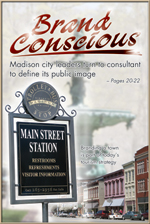



Brand Conscious
Madison
city leaders turn
to consultant to define image
Branding
a town is part of today’s tourism strategy
as communities seek to stand out from the crowd
By
Don Ward
Editor
(June 2008) – Madison, Ind., has long been known
as a historic town. But how many towns have you visited across America
that also claim to be historic?
Madison has long been known as a river town. But how many other towns
have you visited that have a river running through it?
 |
|
June
2008 Indiana |
Madison has long been known as an antiques shopping town.
But antiques shops are everywhere, on every corner of almost every town
you visit.
So what is it about Madison that sets it apart from other towns? What
makes Madison different?
Using a $20,000 Downtown Enhancement state grant as seed money, city
leaders are pooling their funds and in June plan to hire an outside
consultant for $50,000 to $75,000 to help them decide how to define
its marketable public image. Branding is the new hot button for towns
all across America that want to create an image that will attract tourists
and keep them there overnight. That’s because studies show that
visitors who stay overnight spend three times more money than day-trippers.
And tourism is largely funded from bed tax revenue derived from putting
heads in beds.
It’s a competitive battle for some, and an almost insurmountable
challenge for others. But for a historic river town like Madison, which
already boasts the nation’s largest National Historic Landmark
District, a beautiful state park, a state-run historic mansion and a
half-dozen touring museum sites, you would think the task would be easy.
Think again.
“This is not a time when you can rest on your laurels, because
I can tell you that there are towns just up the river that are gunning
for you.” Those words came from national tourism consultant Roger
Brooks, who has evaluated more than 400 cities across America and spent
nearly a week in Madison in early April to critique the town from a
visitor’s perspective.
Brooks conducted a morning workshop on branding on April 15 and presented
a two-hour Powerpoint discussion of his findings and recommendations
that evening to a City Hall Chamber of 35 residents. The presentation
was filmed and later aired on the city’s local Channel 15 Cable
TV station throughout the month.
Brooks’ visit was paid for in part by the state’s tourism
office, which offered the service to a select few cities in Indiana.
Brooks is scheduled to return to southern Indiana this fall to evaluate
Vevay.
The Seattle-based consultant had served as the keynote speaker for the
past two years at the state’s annual Hoosier Hospitality Conference
in Indianapolis. His credentials won over state tourism officials who
then devised a program to get Brooks into Indiana’s tourism towns.
Armed with the grant that was awarded last year to the Madison Main
Street Program and made available from Indiana Main Street and the state’s
Office of Community and Rural Affairs, Madison is about to put the money
to work. Representatives from Mayor Tim Armstrong’s office and
six local organizations have been meeting to select a consultant to
lead the branding campaign. Those represented in the discussions include
Historic Madison Inc., the Jefferson County Board of Tourism, the Madison
Area Convention and Visitors Bureau, the Madison-Jefferson County Industrial
Development Corp., the Madison Chamber of Commerce and the Madison Main
Street Program.
Brooks is among five finalists being considered, said Andy Lytle, the
mayor’s Special Projects Administrator. He added that a decision
is expected to come in early June. The group last met on May 23.
“We’re in the throes of a final decision and will make an
announcement very shortly,” Lytle said.
 |
|
"This
is not a time –
Tourism consultant |
As for Brooks’ presentation in April, Lytle said:
“I’m impressed. He has the ability to address and explain
the recommendations for what we need here. The brand has to be activity
based and one that sets you apart – it’s what you want
to be known for.”
Brooks’ points and recommendations were debated to some degree
by the audience afterward. But one obvious question was, “Who should
lead it?” Brooks said in most cases the city staff helps find the
money and provides the infrastructure or labor to get basic things done,
“but it must be driven by the retailers and guided by the local
CVB (tourism office).” He said “politics kill” such initiatives
in many towns if they rely too much on elected officials to get the
job done.
“Politicians try to be all things to all people, but in this case,
you must make the hard decisions to address real problems if you are
to succeed in the longterm,” Brooks told the crowd.
Madison Area Convention and Visitors Bureau Executive Director Linda
Lytle echoed the sentiments of many in the audience by saying afterward
that what Brooks recommended for the town was nothing new to local residents.
“It just takes someone from the outside to point these things out
to us, before people realize it and want to take action.”
She agrees with Brooks’ recommendations on three basic goals: improved
directional signage to the downtown historic district, consistent store
hours and street beautification. Brooks cited these as the most significant
and easily accomplished goals for immediate action.
He also suggested that the city immediately devise a sign ordinance
to reduce or limit the number of temporary signs that litter the city.
These are those plastic signs on wheels that business owners park out
on the highway in front of their stores and change the lettering on
occasion. “I’ve evaluated more than 400 towns, and only one
other city in Oklahoma has more temporary signs than Madison,”
Brooks said. He said such eyesores do little for the town’s image.
Lytle told the tourism board two weeks after Brooks’ visit that
“I think the partners have a better idea of what has to happen
(in regard to branding). She said requests for proposals from consultants
were mailed in early April, with the hope that the entire process would
be complete by the end of the year and in place well before the city’s
Madison Bicentennial in summer 2009. “We have until Nov. 1 to create
a brand identity,” she said. “Then it is up to us (as a city)
to promote it. It will be a three- to five-year plan to put the brand
into effect.”
She said the partners hope to unveil the new brand by Jan. 1, 2009.
Many local residents who attended Brooks’ branding sessions at
City Hall were new to tourism and the issues involved. Others operate
tourism-related business and were well-versed in attracting and keeping
tourists in town. But all seemed to come away with one thought in mind:
There is much to be done to keep Madison atop the choice of places for
people to visit.
“I have noticed some people changing the ‘business hours’
signs in their windows and doing other things because of what Roger
Brooks said,” said Laura Ratcliff, who owns and operates the Ohio
Theatre with her husband, Tony. “So some individual business owners
have heard the call for change and are already doing something about
it.”
She said the biggest challenge for downtown retailers will be maintaining
consistent business hours because “these are independent business
owners, and no one can tell them when to open and close their shops.”
But since the movie theater is open late seven days a week, the Ratcliffs
find themselves entertaining questions from visitors about what to do
after 6 p.m. and on weekend nights. They open their restrooms to visitors
regardless of whether they are attending a movie. That has given them
a different perspective than most retailers have about who is coming
to town and what they are looking for, she said.
 |
|
Panoramic photo of Madison’s Main Street by Don Ward |
She noted Brooks’ point that most tourism spending
takes place after 6 p.m. and on weekend evenings. But in Madison, that’s
when the majority of retailers are closed. “We’ve grumbled
about maintaining consistent store hours for years, but to make it work,
we have to be unified. And someone’s got to lead it,” Ratcliff
said.
Almost immediately after Brooks left town, the city initiated a beautification
project to install trees, flowers and hanging flower baskets along Main
Street. But this was part of Mayor Armstrong and his wife Debbie’s
campaign goals of beautifying the city and had nothing to do with Brooks.
Wanda Gross, who has operated Wanda’s Gifts on Main Street since
1991 with her husband Dennis, assisted in the project and says the group
had begun planning the beautification project last winter. Brooks recommended
sprucing up the bare, concrete sidewalks with foliage.
Gross said she liked Brooks’ ideas, especially the one about taking
Main Street back to a two-lane corridor with angled parking. Since it
is a state highway, however, that suggestion would be perhaps the most
difficult one to accomplish.
Linda Wenning, who owns and operates Accents and Heirlooms retail store
on Madison’s Main Street, moved to Madison in March 2006 from Gatlinburg,
Tenn., where she operated a retail shop for 35 years. She fell in love
with the beauty of the town and gave up life in the Smoky Mountains
for it.
Now she serves as treasurer of the Madison Main Street Board and has
become an active member of the retail community. She attended Brooks’
session and came away enthusiastic that improvements will come, now
that many problems have been pointed out. “I think a lot of people
are concerned about his comments, as I am, about directional signage
pointing people downtown. We need good signage but not until the branding
is done.”
Wenning took note of a lack of consistent business hours, but added:
“We’re not a shopping mall, we’re a town. It would be
nice if we all kept the same hours, but you can’t make people stay
open on nights and weekends.”
She took the idea a step further, saying, “I wish our historic
sites would stay open year-round because a lot of people come to town
in the offseason to avoid the crowds, only to find our museums are closed.”
She noted Brooks’ call for experience-based tourism as an opportunity
for Madison. We are experienced based, she said, because “people
like to walk the streets and shop and peek into people’s gardens
and stroll along the river. So it is experienced based. But our history
is important as well.”
So it will be up to the consultant to identify and mold a brand that
encompasses the Madison mystique, local retailers and city officials
say. It will likely involve historic preservation and scenic beauty,
but the new “brand” will certainly be counted on to do much
for the town as it strives to stay ahead of its competitors who would
like to replace it as one of Indiana’s gems on the tourism circuit.